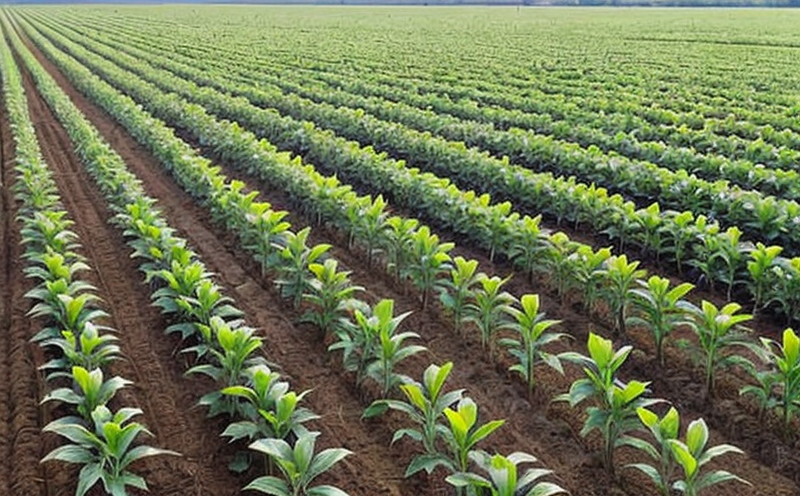ISO 21871 Bacillus cereus Testing in Imported Food
The ISO 21871 standard provides a comprehensive framework for detecting and quantifying Bacillus cereus, an opportunistic pathogen that can cause foodborne illness. This bacterium is particularly dangerous when present in imported foods, as it can lead to serious health issues if not properly controlled during processing and distribution.
The standard applies specifically to the testing of raw agricultural products, processed foods, and ingredients intended for human consumption. It outlines critical steps that must be taken to ensure the safety of these products by identifying the presence of Bacillus cereus spores and toxins. This is crucial in the context of international trade where food safety regulations vary widely across countries.
The testing process involves several key stages, including sample collection, preparation, inoculation with appropriate media, incubation conditions to promote growth, and final analysis using microbiological techniques such as polymerase chain reaction (PCR) or enzyme-linked immunosorbent assay (ELISA). Compliance ensures that imported foods meet the stringent requirements set by international standards.
The ISO 21871 process is designed to minimize the risk of contamination and subsequent outbreak. It helps in preventing the spread of foodborne illnesses, which can have significant economic impacts on both importers and consumers alike. By adhering to this standard, laboratories contribute significantly to maintaining public health standards.
Accurate detection of Bacillus cereus is essential for ensuring that imported foods are safe for consumption. This not only protects consumer health but also enhances trade relations between countries by fostering trust and reliability in the supply chain.
- Sample Collection: Proper collection methods ensure accurate representation of the food batch being tested.
- Inoculation: Inoculating media with samples allows for optimal growth conditions necessary for detection.
- Incubation: Specific temperature and time parameters are crucial for reliable results.
- Analysis: Advanced techniques like PCR or ELISA provide precise quantification of Bacillus cereus.
The implementation of ISO 21871 in government and trade facilitation testing underscores the importance of robust food safety measures. It ensures that imported foods comply with global health standards, thereby protecting public health while facilitating international trade.
Benefits
Adhering to ISO 21871 for Bacillus cereus testing offers numerous advantages:
- Enhanced Food Safety: By detecting and quantifying Bacillus cereus, the risk of foodborne illness is significantly reduced.
- Regulatory Compliance: Ensuring adherence to international standards helps traders meet regulatory requirements in various countries.
- Increased Consumer Confidence: Reliable testing builds trust with consumers, promoting brand loyalty and market growth.
- Economic Stability: By preventing outbreaks due to contaminated products, businesses avoid costly recalls and associated financial losses.
The standard also promotes transparency in the supply chain, allowing for better traceability of imported foods. This is particularly important given the complex nature of global trade networks where origin and handling history can significantly impact product safety.
In summary, implementing ISO 21871 not only improves food safety but also enhances regulatory compliance, boosts consumer confidence, and contributes to economic stability within the trading community.
Industry Applications
The application of ISO 21871 extends beyond mere laboratory testing; it plays a pivotal role in various sectors:
- Agricultural Sector: Ensures that raw agricultural products do not harbor Bacillus cereus, thus safeguarding the entire food chain.
- Food Processing Industry: Guarantees that processed foods meet stringent safety standards, protecting public health.
- Agricultural Trade Facilitation: Supports international trade by ensuring compliance with global regulations and reducing the risk of contamination.
In essence, ISO 21871 serves as a cornerstone for food safety in agricultural and food import testing. Its universal applicability ensures that all imported foods are subject to rigorous scrutiny, thereby maintaining high standards of hygiene and quality.
Quality and Reliability Assurance
The reliability and accuracy of ISO 21871 tests are paramount in ensuring the safety and integrity of imported food products. Here is a detailed look at how these tests contribute to quality assurance:
- Precision Instruments: Utilizing high-precision instruments like PCR machines or ELISA kits ensures consistent and accurate results.
- Standard Operating Procedures (SOPs): Adhering to strict SOPs guarantees that every step of the testing process is followed correctly, leading to reliable outcomes.
- Regular Calibration: Regular calibration of equipment ensures that all instruments perform at optimal levels throughout their lifecycle.
- Training and Certification: Ensuring that personnel are trained according to international standards enhances reliability. Personnel should be certified in handling and analyzing Bacillus cereus.
The combination of these factors ensures that ISO 21871 tests are both precise and reliable, providing accurate data for decision-making processes within the agricultural and food industry.





